
Supporting the Needy
A Responsibility We Cannot Neglect!
We all have needs — a trite statement, but one that reverberates far beyond what we might think. All of us require food, clothing, and shelter to live, and we might add to that transportation and communication devices in this modern world. If we do not have them we simply cannot survive in this modern world.
Let us add to this fact the truth that in today’s world money is usually essential to obtain these essentials. Without dollar bills, gold, silver, or some representation of wealth you will not survive, unless you are a hermit living far from civilization with a garden and livestock. Even then you will likely need to pay for property taxes and certain other essentials that are bound to crop up.
 We shall add yet another fact to this growing list of truths. God owns everything. The silver and gold (Haggai 2:8), and everything on earth is His: “The earth is the Lord’s, and the fullness thereof” (Psalm 24:1; I Corinthians 10:26, 28), including the people that dwell on the earth. That includes the plants and animals that provide food for mankind to sustain him in his daily living.
We shall add yet another fact to this growing list of truths. God owns everything. The silver and gold (Haggai 2:8), and everything on earth is His: “The earth is the Lord’s, and the fullness thereof” (Psalm 24:1; I Corinthians 10:26, 28), including the people that dwell on the earth. That includes the plants and animals that provide food for mankind to sustain him in his daily living.
Not a Perfect World
I will make another trite statement: We do not live in a perfect world. We have living among us those who do not have enough funds to adequately support themselves. Such has been the case throughout man’s history on earth, as it surely was during the days of the Israelites. Note what the Eternal stated in Deuteronomy15:7-8:
“If there is among you a poor man of your brethren, within any of the gates in your land which the Lord your God is giving you, you shall not harden your heart nor shut your hand from your poor brother, but you shall open your hand wide to him and willingly lend him sufficient for his need, whatever he needs.”
The implication here is that there would be poor people in ancient Israel who would need help, even as Jesus Christ stated there would always be throughout the centuries (Matthew 26:11; Mark 14:7; John 12:8) This was not God’s intention for man if he would obey His instructions:
“… except when there may be no poor among you; for the Lord will greatly bless you in the land which the Lord your God is giving you to possess as an inheritance — only if you carefully obey the voice of the Lord your God, to observe with care all the commandments which I command you today” (Deuteronomy 15:4-5).
The Eternal makes it possible for us to gain wealth, such as He blessed Abraham with much gold, silver, and cattle (Genesis 13:2), and Job with livestock and children (Job 1:1-3) That wealth we do not really own; it belongs to the Creator. We are only caretakers of it once He gives it to us.
In contrast to the world outside the Garden of Eden, the Edenic world was one of total sufficiency for living. It was the perfect environment for man to live, providing all of the necessities of life. The very word Eden comes from the Hebrew root adan, meaning “to be soft or pleasant, figuratively to live voluptuously.” Thus we read in Genesis 2:8-9:
“The Lord God planted a garden eastward in Eden, and there He put the man whom He had formed. And out of the ground the Lord God made every tree grow that is pleasant to the sight and good for food. The tree of life was also in the midst of the garden, and the tree of the knowledge of good and evil.”
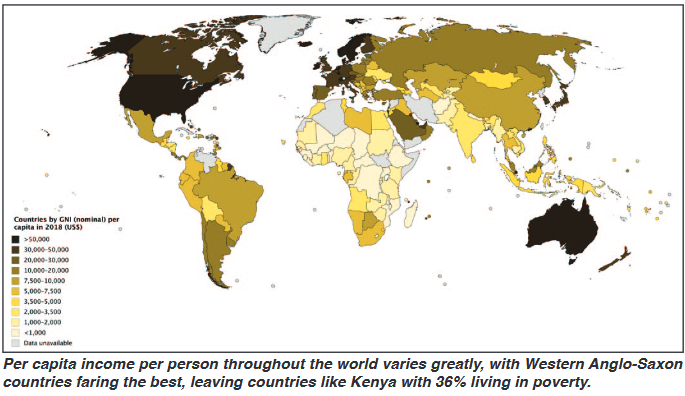
This environment is hardly that of the present-day world, with its heat and deserts, cold and icecaps, hurricanes and floods, diseases and starvation, crowding of people into cities, transport of food and energy thousands of miles, and a near-total reliance on a money system to acquire anything — from food to clothing to land to automobiles to entertainment and education. Virtually everything nowadays is tied to money … a far cry from the system in Eden where everything was free. We are not living in the perfect world that God intended for mankind. We are living in a merchandising society, a response to the first sin of Lucifer way back in Eden well before Adam and Eve were placed there (Ezekiel 28:16).
merchandising = rkullah, “trade (as peddled)”; from rakal, “to travel for trading.” The word Kena’aniy [Canaanite] interestingly means merchant, as one who gains his living by trading. Is it a coincidence that the evils of the Canaanites were related to the worship of pagan deities, which is related to their central proclivity to trade, ie., merchandise in the footsteps of Lucifer’s first sin?
God’s Messages Concerning the Poor and Needy
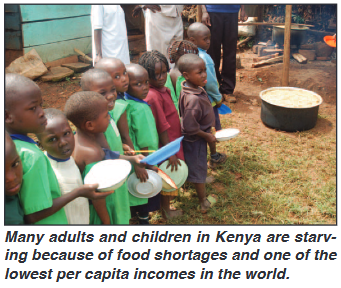 Those who are poor and in want did not become that way willingly. We might exempt a religious zealot who has taken an oath of poverty, but even they are supplied the essentials of life by their religious order. According to ourworldindata.org, 11% of the population of the United States lives in poverty, those who live on less than $24.55 per day. Because of the differences in living costs, 23% of Ethiopians live in poverty having less than $2.04 per day to support themselves. Extreme poverty is defined as living on less than $2.15 per day, according to the World Bank’s Poverty and Inequality Platform. In Kenya, an astonishing 36% of the population lives in poverty.
Those who are poor and in want did not become that way willingly. We might exempt a religious zealot who has taken an oath of poverty, but even they are supplied the essentials of life by their religious order. According to ourworldindata.org, 11% of the population of the United States lives in poverty, those who live on less than $24.55 per day. Because of the differences in living costs, 23% of Ethiopians live in poverty having less than $2.04 per day to support themselves. Extreme poverty is defined as living on less than $2.15 per day, according to the World Bank’s Poverty and Inequality Platform. In Kenya, an astonishing 36% of the population lives in poverty.
How are we to react to the poor and needy? Notice the following points.
1. Give of your substance to the poor. The references to this plan are many (Deuteronomy 15:7-8; Proverbs 31:20; Luke 3:11; Acts 20:35; Romans 12:13; 15:26-27; Galatians 2:10; etc.).
a. Give through your actions, not just through empty words.
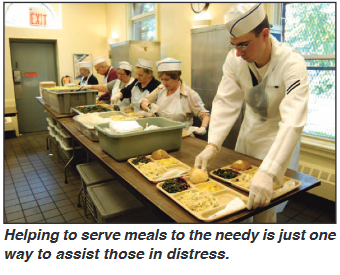 “If a brother or sister is naked and destitute of daily food, and one of you says to them,’Depart in peace, be warmed and filled,’ but you do no give them the things which are needed for the body, what does it profit” (James 2: 15-16)?
“If a brother or sister is naked and destitute of daily food, and one of you says to them,’Depart in peace, be warmed and filled,’ but you do no give them the things which are needed for the body, what does it profit” (James 2: 15-16)?
b. If someone asks you for something to fulfill an essential need, if you are able, then give it.
“Give to him who asks you, and from him who wants to borrow from you do not turn away” (Matthew 5:42).
c. Give even to those who cannot repay you, and you can expect to attain the resurrection of the just!
“But when you give a feast, invite the poor, the maimed, the lame, the blind. And you will be blessed, because they cannot repay you; for you shall be repaid at the resurrection of the just” (Luke 14:13-14).
d. Your giving must come from the heart (Luke 11:39-41).
e. Work to supply enough substance to be able to give to the needy.
“Let him who stole steal no longer, but rather let him labor, working with his hands what is good, that he may have something to give him who has need” (Ephesians 4:28).
2. Recognize that when you give to the poor you are giving to God.
“He who has pity on the poor lends to the Lord, and He will pay back what he has given” (Proverbs 19:17).
“And the King will answer and say to them, ‘Assuredly, I say to you, inasmuch as you did it to one of the least of these my brethren, you did it to Me’” (Matthew 25:40; see also Mark 9:41). These deeds include feeing the hungry, giving drink to the thirsty, taking in strangers, clothing the naked, and visiting prisoners (Matthew 25:35-36).
3. Understand that there is an automatic reward of blessings for you by giving to the poor.
“The generous soul will be made rich, and he who waters will also be watered himself” (Proverbs 22:9).
“He who gives to the poor will not lack, but he who hides his eyes will have many curses” (Proverbs 28:27).
a. These blessings include deliverance from troubles, including illness.
“Blessed is he who considers the poor; the Lord will deliver him in time of trouble. The Lord will preserve him and keep him alive, and he will be blessed on the earth; You will not deliver him to the will of his enemies. The Lord will strengthen him on his bed of illness; You will sustain him on his sickbed” (Psalm 41:1-3).
b. What you do for others will be heaped upon yourself.
“Give, and it will be given to you; good measure, pressed down, shaken together, and running over will be put into your bosom. For the same measure that you use, it will be measured back to you” (Luke 6:38).
4. Your giving must be spontaneous, coming from a personal decision before God.
“You shall surely give to him [your poor brother], and your heart should not be grieved when you give to him, because for this thing the Lord your God will bless you in all your works and in all to which you put your hand” (Deuteronomy 15:10).
“So let each one give as he purposes in his heart, not grudgingly or of necessity; for God loves a cheerful giver” (II Corinthians 9:7).
5. You must not show preference to the rich above the poor, or vice-versa.
a. God is no respector of persons (Deuteronomy 16:19; Proverbs 24:23; Act 10:34; Romans 2:11; Ephesians 6:9; I Peter 1:17).
b. Refrain from showing preference to either the poor or rich.
“You shall not show partiality in judgment; you shall hear the small as well as the great; you shall not be afraid in any man’s presence, for the judgment is God’s …” (Deuteronomy 1:17).
“My brethren, do not hold the faith of our Lord Jesus Christ, the Lord of glory, with partiality …. Listen, my beloved brethren: has God not chosen the poor of this world to be rich in faith and heirs of the kingdom which He promised to those who love Him? … But if you show partiality, you commit sin, and are convicted by the law as transgressors” (James 2:1, 5, 9).
6. When you give to the needy you boost your own health and attitudes.
“”If you extend your soul to the hungry and satisfy the afflicted soul, then your light shall dawn in the darkness, and your darkness shall be as the noonday. The Lord will guide you continually, and satisfy your soul in drought, and strengthen your bones; you shall be like a watered garden, and like a spring of water, whose waters do not fail” (Isaiah 58:10-11).
7. If you are wealthy you must not set your hopes on riches, but share your wealth with the needy.
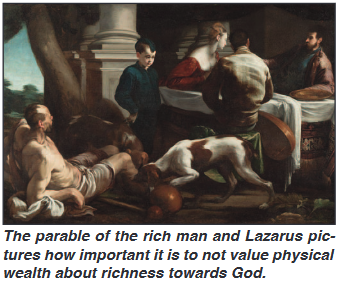 “Command those who are rich in this present age not to be haughty, nor to trust in uncertain riches but in the living God, who gives us richly all things to enjoy. Let them do good, that they may be rich in good works, ready to give, willing to share, storing up for themselves a good foundation for the time to come, that they may lay hold on eternal life” (I Timothy 6:17-19).
“Command those who are rich in this present age not to be haughty, nor to trust in uncertain riches but in the living God, who gives us richly all things to enjoy. Let them do good, that they may be rich in good works, ready to give, willing to share, storing up for themselves a good foundation for the time to come, that they may lay hold on eternal life” (I Timothy 6:17-19).
8. Give to the poor in secret so that your heavenly Father will reward you in public.
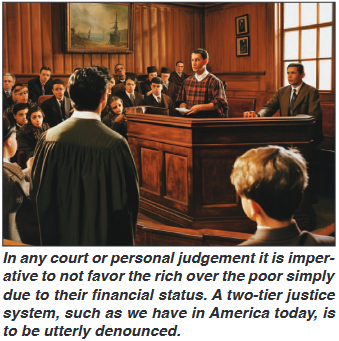 “But when you do a charitable deed, do not let your left hand know what your right hand is doing, that your charitable deed may be in secret; and your Father who sees in secret will Himself reward you openly” (Matthew 6:3-4).
“But when you do a charitable deed, do not let your left hand know what your right hand is doing, that your charitable deed may be in secret; and your Father who sees in secret will Himself reward you openly” (Matthew 6:3-4).
9. Be sure to promote justice for the poor.
“The righteous considers the cause of the poor, but the wicked does not understand such knowledge” (Proverbs 29:7)
10. Expect nothing in return for your gifts to the poor.
“And if you lend to those from whom you hope to receive back, what credit is that to you? For even sinners lend to sinners to receive as much back. But love your enemies, do good, and lend, hoping for nothing in return; and your reward will be great, and you will be sons of the Most High. For He is kind to the unthankful and evil” (Luke 6:34-35).
11. Give to the poor in proportion to what substance you have.
“Now Jesus sat opposite the treasury and saw how the people put money into the treasury. And many who were rich put in much. Then one poor widow came and threw in two mites, which made a quadrans [perhaps worth a penny]. So He called His disciples to Himself and said to them, ‘Assuredly, I say to you this poor widow has put in more than all those who have given to the treasury, for they all put in out of their abundance, but she out of her poverty put in all that she had, her whole livelihood’” (Mark 12:41-44).
12. Do not be afraid to consult other brethren concerning who may be in need.
“Nor was there anyone among them who lacked, for all who were possessors of lands or houses sold them, and brought the proceeds of the things that were sold, and laid them at the apostles’ feet; and they distributed to each as anyone had need” (Acts 4:34-35).
This does not imply that the newly-baptized brethren sold all of their possessions for distribution to the poor, for that would mean they themselves would become poor and needy, dependent on other brethren for assistance. Rather, this means that some of their possessions were sold to help relieve those in need.
Consequences of Failing to Help the Poor
God’s word makes clear that failing to help the poor and needy when you are aware of the need, and are able to help, carries with it quite dire warnings. Look at a few of these warnings.
1. We are instructed not to oppress the poor.
“Thus says the Lord of hosts: ‘Execute true justice, show mercy and compassion everyone to his brother. Do not oppress the widow or the fatherless, the alien or the poor. Let none of you plan evil in his heart against his brother’” (Zechariah 7:9-10).
2. You insult the Creator by failing to help the poor and needy.
“He who oppresses the poor reproaches his Maker, but he who honors Him has mercy on the needy” (Proverbs 14:31).
3. By neglecting helping the poor you prove that God’s love is not in you.
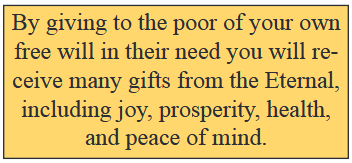 “By this we know love, because He laid down His life for us. And we also ought to lay down our lives for the brethren. But whoever has this world’s goods, and sees his brother in need, and shuts up his heart from him, how does the love of God abide in him” (I John 3:16-17)?
“By this we know love, because He laid down His life for us. And we also ought to lay down our lives for the brethren. But whoever has this world’s goods, and sees his brother in need, and shuts up his heart from him, how does the love of God abide in him” (I John 3:16-17)?
4. You will receive many woes by neglecting the needy.
“He who gives to the poor will not lack, but he who hides his eyes will have many curses” (Proverbs 28:27).
5. If you fail to help the poor when you are able, your prayers will not be heard.
“Whoever shuts his ears to the cry of the poor will also cry and not be heard” (Proverbs 21:13).
“One who turns away his ear from hearing the law, even his prayer is an abomination” (Proverbs 28:9).
We read of the self-centered, licentious society of Sodom and Gomorrah, how they tormented Lot and the two angels who visited Lot’s home (Genesis 19), but the evils of the Sodomites did not end there. They were a notoriously selfish people as Ezekiel 16:49 states:
“Look, this was the iniquity of your sister Sodom: she and her daughter had pride, fulness of food, and abundance of idleness; neither did she strengthen the hand of the poor and needy.”
As king Solomon discovered, wealth cannot satisfy (Ecclesiastes 2:11, 18, 26), and he even concluded that, “… to the sinner He gives the work of gathering and collecting, that he may give to him who is good before God” (Ecclesiastes 2:26). Jesus Christ made clear that it is difficult for a rich man to enter the Kingdom of God, since the “… deceitfulness of riches chokes the word …” (Matthew 13:22; 19:23). Yet a good man who is rich, like Abraham, Job, David, Joseph of Arimathea, and others did not let their riches choke the word of God in their lives. On the other hand, those who are poor in physical terms find it easier to cling closely to their Creator, even as Christ stated in the Sermon on the Mount, “Blessed in spirit are the poor” (Matthew 5:3, Concordant Version).
The Joy of Giving to the Poor!
It may seem counterintuitive that someone who gives away a part of his wealth will end up with more wealth in the end, and be blessed in life along the way. Yet, that is exactly what the Eternal says is the case!
There are great blessings in giving of one’s substance to those in need, the most coveted one being, as we have already seen, the resurrection itself (Luke 14:13-14; 18:22). Giving to the poor reveals our true focus in life, that we are helping others in need even as we would wish to be helped if we were in their shoes. It is fulfilling the meaning of the law and the prophets (Matthew 7:12; 22:40), gaining “… a treasure in the heavens that does not fail, where no thief approaches nor moth destroys” (Luke 12:33).
The one who gives to the poor is righteous, shows that he knows God, and will endure forever (Psalm 112:9; Jeremiah 22:16). Giving to someone in need reflects an attitude of selfless serving (Luke 22:25-27). This act grants deep-seated joy to the giver, and tends toward God-plane humility, which is essential to approach our heavenly Father (Isaiah 66:2; Psalm 34:18; 51:17).
It is no sin to be poor and needy, and those of us who have enough substance should help them when appropriate. These disparities in wealth should alert us to the need for a society in which everyone will have plenty, like in that perfet environment of the Garden of Eden where everything to sustain life was free. That will be the condition of the next age — the restoration of Eden across the entire earth — when the “times of refreshing” and the “times of restoration of all things” will occur to replace this present evil age, as prophesied for millennia (Acts 3:19-21). Then the poor will cease to exist, for they will be rich!

